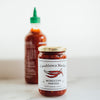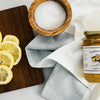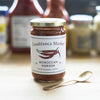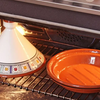Beldi Glasses: How They're Made & More!
- by Katia Essyad
Eco-friendly, elegant, functional, and enjoyable to use: Once you go Beldi, you don’t go back.
Here’s how Beldi glasses are sustainably made, and why everyone should have a set of these handcrafted drinking glasses in their homes.
Casablanca Market | Moroccan Glassblowing | Behind The Scences from casablanca market on Vimeo.
Ever since 1940 in Morocco, two tons of flat glass and glass bottle waste go into a 1600° furnace to be melted, hand blown, and hand shaped into perfectly imperfect drinking glasses, every single day. It received the name “Beldi” for its traditional, rural, and sustainable process–a widely used Moroccan term that’s applied to all things made with love and care. The micro-imperfections that come with such a hands-on process–tiny air bubbles and divots–make each beautiful, unique, and an absolute joy to use. With so many shapes, colors, and personalities, there’s a Beldi glass that encapsulates your unique style and spirit.
1. Warming the Glass
Recycled materials are often used in order to reduce waste and promote sustainability. In Morocco, waste is seen as a sin and is avoided at all costs.


2. Early Forming
The red-hot glass is carefully manipulated towards the basic shape of the product being created. This is achieved by rolling it on metal, rotating the rod, or any other method necessary.
3. Glass Blowing
This is the part of the process that requires the most skill - these artisans have mastered the art of glassblowing and make it look easy. This step requires vigilant eyes, a deep understanding, and precise inputs to maintain the shape and thickness that they are looking for.

4. Making Adjustments
Even though the bowl or glass may look finished, there are usually some refinements that can be made to improve the final look - whether it be smoothing out a small bump or fixing the curves of the mouthpiece, their strong attention to detail makes these easy to spot.
5. Painting
The glassblower's job ends here, and the piece is sent to painters, who will meticulously hand paint each item. The painting can range anywhere from just a solid color to intricate berber designs.
6. Finished Product
Finally, the product is finished - small imperfections are visible on each glass, which adds character to it’s unique beauty.











